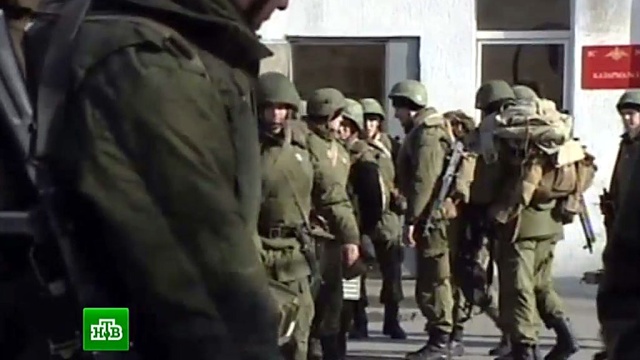Yesterday’s liveblog can be found here. An archive of our liveblogs can be found here. For an overview and analysis of this developing story see our latest podcast.
Please help The Interpreter to continue providing this valuable information service by making a donation towards our costs.
View Ukraine: April, 2014 in a larger map
For links to individual updates click on the timestamps.
For the latest summary of evidence surrounding the shooting down of flight MH17 see our separate article: Evidence Review: Who Shot Down MH17?
Below we will be making regular updates so check back often.
A number of photos of Russian armored convoys and troops circulating on social media are causing concern that another Russian military invasion may be in the making. (We covered Russian armor moving into Ukraine in the last two days to Makeyevka and then Donetsk.)
The photos were taken by an Instagram user with the nickname of “avto25“. They were automatically geolocated to Vladivostok, to the Vtoraya Rechnaya [Second River] Railway Terminal approximately here on Google Maps.

That’s a long way from Donetsk – about 9,500 kilometers in fact — but the concern is that troops were being rallied from different locations to eventually make their way to Ukraine (as they did in the takeover of Crimea.)
Avto25 published three photos, one of a flatbed with troops and trucks covered with tarps; a second one by the river terminal with the armor; and a third one at night showing the convoy.
This last photo and his comment were removed.
Ukrainska Pravda covered the story, and was able to screen-capture the third photo. We have verified that there is such an account on Instagram and the other two photos were still there.
On the third, now removed photo, avto25 writes (translation by The Interpreter):
#notowar When they brought the guys the last delivery of water, I saw how seriously they were all camouflaged, with bullet-proof jackets, and dozens of special devices and so on. WTF… #Vladivostok #Primorye #DPR #LPR #VL #VDK
In a discussion on the second photo, one user asks, “Why do you believe that this is in fact going to Donbass? Did they tell you that?”
The original poster didn’t answer, but another user replied, “They are already riding around Donetsk…And that doesn’t look like stolen vehicles, the KAMAZes have bullet-proof glass.”
He’s referring to the convoys seen in Minsk the last few days, which we geolocated.
Another user writes:
It’s too bad, the whole convoy will burn up there. It’s f**ked with those KAMAZes and cannons, it’s too bad for the guys who will get killed on both sides… ( ( (. And on the death certificate it will say they died of a heart attack during training…
But is this convoy in fact in training?
A user named @vishnya125 writes in the comments on avto125’s picture:
The author of this advertisement has done his business well ))) you idiot, they are already citing you in the Ukrainian media!!! And the guys are just having a good laugh ))). Everyone knows that large-scale exercise took place and troops from the Central District took part in it! Now they are returning! Any resident of Vladivostok could verify this, everyone has acquaintances serving in the army!
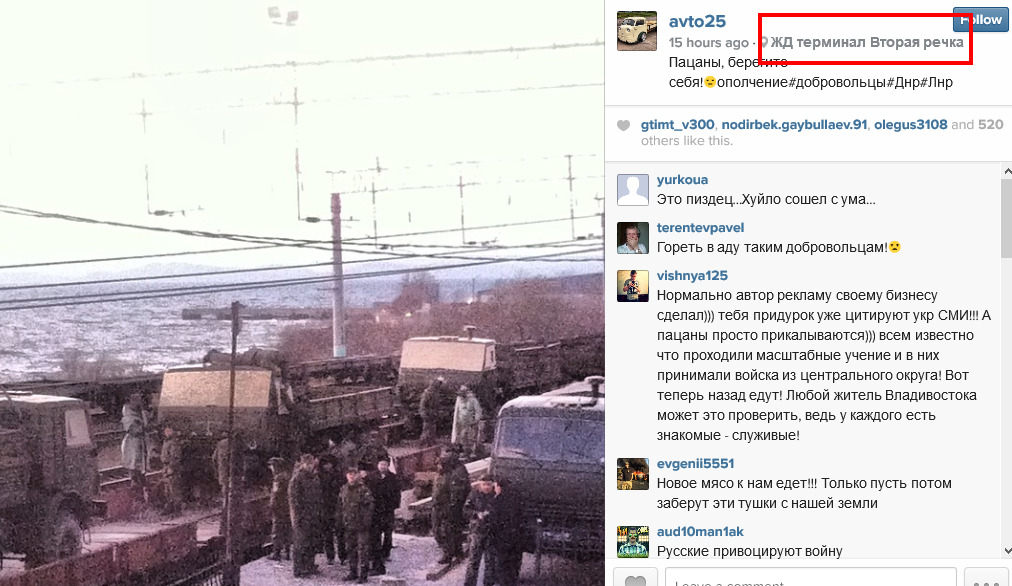
A search through Russian media today established that sure enough, state-owned NTV had a broadcast today about a sudden, wide-scale exercise involving 150,000 troops from the Central and Western Military Districts.
Even Defense Minister Sergei Shoigu got advance notice of the test of combat readiness only the night before.
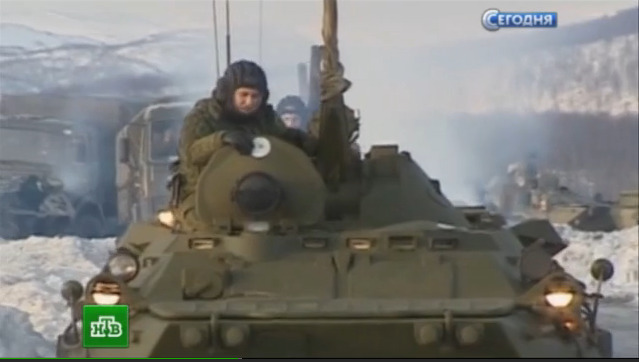
The troops reported to NTV that they were required to travel as much as 1,000 kilometers for the exercise which focused on response to terrorism or an epidemiological disaster.
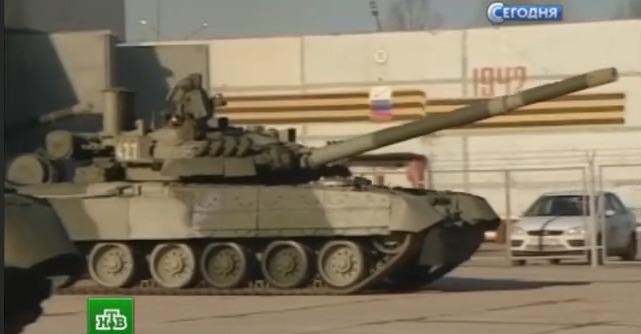
This is a two-stage exercise, and tomorrow will the air defense and air force will be tested.
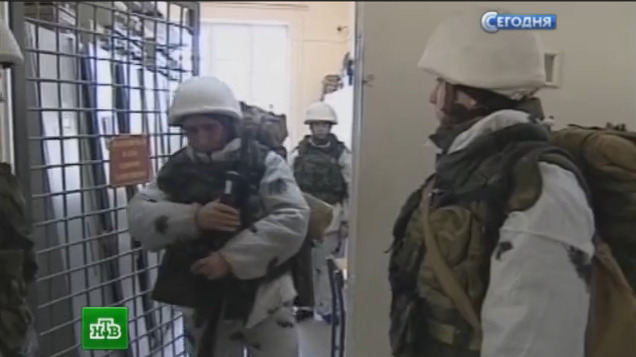
Journalists Maxim Eristavi and Oliver Carrol spoke to Mashable’s Christopher Miller last night on Hromadske. Miller reported seeing an increase in military convoys in Donetsk — some of them so large that they took several minutes to drive by. Caroll reported that just two weeks ago there was very little military activity, so this is new, but that he is not surprised since separatist leaders have repeatedly threatened to launch new offensives.
The entire conversation, which includes other videos, can be viewed below.
Despite reports that Ukrainian President Petro Poroshenko was going to abolish the Minsk agreement and/or the “special status” for the Donbas, the full official English statement is now available, and as the excerpt below shows, Poroshenko has only said that such a move will be discussed at tomorrow’s meeting with the NSDC (National Security and Defense Council):
Yesterday’s pseudo-elections in part of the Donbas are completely opposite to the voting of October 26. Unfortunately, it is a part still controlled by militants. This farce at a gunpoint has nothing in common with the expression of will. It cannot be called elections by its definition.
Bandits, terrorists and interventionists can coronate themselves deputies, prime-ministers and ministers. They may even call themselves kings or emperors. Still, no matter what they put on their heads, they will remain occupants, criminals and militants. Ukraine will never recognize the so-called elections of November 2. We cannot respect the choice that exists neither actually nor legally. No country in the world that respects itself and the international law will recognize the so-called elections. This farce has already been condemned by the EU, the United States, dozens of our countries-partners. Spokesman of German Government stated today that abolition of sanctions against Russia was out of discussion.
Pseudo-elections are a brutal violation of Minsk protocol of September 5. Minsk protocol provides for the holding of early local elections in the part of the Donbas solely under the laws of Ukraine. We provided them with the given opportunity. Farce of November 2 jeopardizes the entire peace process the beginning of which has been achieved at the cost of outstanding efforts. It substantially worsens the situation in the Donbas. Performers, organizers and sponsors of pseudo-elections are fully responsible for that.
Ukraine strictly adheres to the letter and spirit of Minsk protocol. Against the backdrop of its brutal violation by the other parties, we have to adjust our plan of actions. I have already discussed the new situation with the Defense Minister. Tomorrow, I will have the NSDC meeting at which we will comprehensively analyze the situation and make necessary amendments to the scenarios of our actions taking into account both optimistic and pessimistic forecasts.
One of the issues to be submitted for consideration by the NSDC is the abolishment of the law on peculiarities of the local government in certain districts of Donetsk and Luhansk regions. In due time, this law performed an extremely important role in stemming foreign invasion, mobilizing world’s support of Minsk peace agreements, sincerity of Ukraine’s intentions on de-escalation of the situation in the Donbas. We demonstrated residents of Donetsk and Luhansk regions as well as the whole world that we are sincere in our desire for the political settlement. Militants refused this opportunity. Holding of pseudo-elections undermined the law and aggravated the situation in the Donbas. We are ready to provide broad powers laid down in the law only to the legally elected local government, not to the bandits who coronate themselves.
However, decentralization remains in our arsenal as the key element of political settlement in the Donbas. We will be willing to approve the new law if all the parties return to the fulfillment of Minsk protocol. In case of the ceasefire, establishment of buffer area and control over the border. And in case of clear actions of militants to signalize the reverse in the issue of the so-called elections of November 2.
The new law will provide for clear boundaries of districts with special order of local government in clear conformity with Minsk agreements. It will also provide for budgetary decentralization that will eliminate the irritating question “who feeds whom”. It will let these districts be responsible for their self-funding on the basis of their own resources. Everyone will get what he deserves with his work.
Once again we are witnessing a rhetorical war of words, a chess game between Kiev and Moscow for positioning for the moral high ground. Here is the current state of play:
– Ukraine says that the separatist elections are a “farce” and a break with the Minsk agreements which brought about the ceasefire. As a result, as we’ve just reported, Ukrainian President Petro Poroshenko is considering scrapping the Minsk agreement entirely.
– Russia says those same elections are a step in the right direction and now offer up a legitimate platform for dialogue between Kiev and the Donbass.
– Russian-backed leaders are now weighing in, saying that they’ll abide by the Minsk accords as long as Kiev asks “reasonable.”
Breaking Defense reports:
“You’ve seen a series of truck convoys going in and out of eastern Ukraine, none of those approved by the Ukrainian government,” said Gen. Breedlove , commander of both US and NATO forces in Europe, during a Pentagon press briefing this morning. “The Ukraine-Russia border is wide open in these places [and] Russian equipment, resupply, training flows back and forth freely.” About 250 to 300 Russian advisors are currently on Ukrainian territory, he said. That’s a far cry from the 4,000 troops in some reports, a figure Breedlove dismissed, but it’s still a critical source of technical expertise (and probably political direction) for the ragged separatists.
Meanwhile, despite what Breedlove likes to call “a ceasefire in name only” between the separatists and Ukrainian government forces, continuing clashes have turned the frontline between Kiev and rebels into something more and more like a border between two states. “We have seen a general trend towards a hardening of this line of demarcation and much more softening of the actual Ukraine-Russia border,” Breedlove said. Over time, he said, “what has changed is the line of demarcation has become…more defined, and the Ukraine-Russian border behind it has become completely porous.”
To put Breedlove’s assessment in blunter terms: Russia and its proxies are successfully erasing the legal, internationally recognized border and drawing a new de facto frontier further west.
So there is a war of words here over who has broken the Minsk agreement, but both sides are posturing and maneuvering their rhetorical arguments on the board to claims the moral high ground. We’ve seen this kind of rhetorical dance each time there has been an escalation in Ukraine. Unfortunately, what we’ve also seen before is that this game of chess, a simulated and rhetorical battle, typically ends in an actual battle in eastern Ukraine.
The U.S. Ambassador to the OSCE, Daniel B. Baer, has in no uncertain terms condemned the “so-called ‘elections'” in eastern Ukraine:
The United States strongly condemns the holding of yesterday’s illegitimate, so-called local “elections” that contravene Ukraine’s laws and constitution and contradict the September 5 Minsk Protocol. Despite the uniform concern voiced by the international community over the proposed holding of these so-called elections, Russia failed to act in line with the agreement it signed less than two months ago, in order to prevent yesterday’s actions that only seek to undermine a stable, united, and prosperous Ukraine. In so doing, Russia proved that it continues to act in defiance of international law and the fundamental norms of international behavior that have underpinned peace and security in Europe for over a generation.
Mr. Chair, the government of Ukraine and the international community have arduously sought to secure a path towards Ukraine’s stable future, while in contrast Russia chose to escalate once again. Yesterday marked the initiation of yet another phase of Russia’s escalatory, intolerable, and illegal actions in Ukraine. While the Russian Federation may claim to seek a peaceful outcome in Ukraine, the commitments it signs are rendered meaningless when it conducts actions that directly undermine Ukraine’s sovereignty and territorial integrity.
Note that Baer also infers that there is a connection between the increased ceasefire violations and the elections, and also infers that Russia is directly responsible.
The entire statement will likely soon be available in English.
On the other hand, Kyiv Post is carrying news that a “special status” for Donbass may still be in the works.
Paul Goble writes on our Window On Eurasia column:
Vladimir Putin has a very clear strategy in Ukraine: first, sow panic among Ukrainians and the West and then wait, then provoke Ukrainians into doing things that distance them from the West, and then wait; invade when both Ukrainians and the West are off balance; and then repeat the process.
Such a strategy, one could almost call it a recipe given its invariability, reflects three unfortunate facts: First, Putin has a longer time horizon than do either Ukrainians or Western governments. He doesn’t have to achieve all his goals all at once, whereas they want a resolution extremely quickly. By sowing panic, he is promoting his program.
Read the entire article here: Putin’s Strategy in Ukraine – Sow Panic, Provoke, Invade and Then Repeat the Process
Below is a statement published by Ukrainian President Petro Poroshenko:
The so-called elections in the occupied districts of Donetsk and Luhansk regions have nothing in common with people’s expression of the will and brutally violate Minsk agreements, as stated by President of Ukraine Petro Poroshenko.
President Poroshenko claims that “farce at a gunpoint organized by the two terrorist organizations in parts of the Donbas is a terrible event that has nothing in common with the real expression of the people’s will.”
Ukraine alongside the entire civilized world do not recognize this farce. “The international community, including many states and organizations, has already condemned these so-called elections. I expect that Russia condemns them as well, since it is a brutal violation of Minsk protocol of September 5 also signed by the representative of Russia,” noted the Head of State.
Petro Poroshenko also stated that “all elections on the Ukrainian territory, in which the Ukrainian citizens vote, should be held solely under the legislation of Ukraine”.
The President stressed that Minsk protocol provides for holding of early local elections in certain districts of the Donbas solely under the laws of Ukraine. Otherwise, gross violation of international agreements will jeopardize the peace process and Ukraine will adequately respond to this challenge.
At the same time, the President of Ukraine expressed gratitude to the people of the Donbas who had come out to the streets of Mariupol and other cities to support the unity of Ukraine.
With each passing day, the ceasefire appears to be stretched and
broken more than the last. Just two weeks ago fighting was on the
decrease across Ukraine, but since parliamentary elections were held on October 26th, the fighting has just gotten worse.
It appears that now that the Russian-backed separatists have “elected”
the current self-appointed heads of the self-declared ‘Donetsk People’s
Republic,’ Alexander Zakharchenko, and his counterpart in the
self-declared ‘People’s Republic of Lugansk,’ Igor Plotnitsky, the
separatists appear to be launching new offensives.
The National Security and Defense Council has this summary of the fighting:
The bottom line is that after days of increased violence and increased Russian activity, Ukrainian authorities are now reporting just more troop movement. At the same time, we reported earlier that after a night of heavy fighting, separatists near Lugansk (Checkpoint 31, on the Bakhmutka highway in the Lugansk region) have given Ukrainian soldiers an ultimatum.
They’re not the only ones making threats. Russia has suggested that Ukraine needs to back down its military offensive in the east. They make no mention, however, of the fact that Ukraine claims to only be returning fire, and there’s no indication that the Ukrainian forces are advancing in any areas of eastern Ukraine. The Guardian reports:
Russia has called on Ukraine to halt its military offensive against pro-Moscow rebels in the east, saying the insurgent leaders have enough authority to hold talks with Kiev after elections in parts of the country under their control.
The deputy foreign minister, Grigory Karasin, made the appeal after Moscow recognised separatist elections in two eastern Ukraine regions dismissed as illegal by Kiev and the west…
“The elected representatives of Donetsk and Luhansk regions obtained a mandate to hold negotiations with central Ukrainian authorities to solve problems … via a political dialogue,” Karasin said.
Yesterday, Ukrainian President Petro Poroshenko was clear that Sunday’s elections were a violation of the Minsk agreement. But the Russian state-operated news agency ITAR-TASS reports that Moscow is recognizing the elections as “valid” and sees them as part of what was agreed upon in Minsk:
“The elections in the Donetsk and Luhansk regions were held in an organized way in general and with high voter turnout,” the ministry said.
“We respect the will expression of the citizens of the south-east.”“The elected representatives have received a mandate to solve political tasks to restore normal life in the regions,” the statement says.
“Taking into consideration the elections, it is essential to take active steps to set up a sustainable dialogue between the central Ukrainian authorities and representatives of Donbass in line with agreements reached in Minsk,” the ministry stresses.
What should we make of all of this? The exact terms of the Minsk agreements are vague, some have suggested purposefully so. Ukraine agreed to a ceasefire at the end of August, when Russian soldiers and Russian-backed militants were overrunning Ukrainian military positions in eastern Ukraine. Poroshenko agreed to give eastern Ukraine greater autonomy via an undefined “special status” which included local elections. Russia and the Russian-backed separatists may have interpreted that agreement differently than Kiev, but Kiev knew that they would. At the end of the day, the Russians will recognize these elections and Kiev will reject them.
The big unanswered question, however, is whether this conflict will actually be frozen (or near frozen, with fighting on the periphery, as we’ve seen for the last two months) or whether the Russian-backed separatists see this as the time to expand their territory and fight for their complete “independence.” If the latter happens — and there’s a growing body of evidence that it might — the question then becomes how hard the Kremlin will support those efforts. Will we see an outright Russian invasion 2.0, a continuation of what was happening in the last week of August?
Ukraine’s Podrobnosti reports that Sergei Kurchenko, a 29-year-old oligarch who rapidly rose to prominence as a gas mogul in the Yanukovych era, bought out the Ukrainian edition of Forbes after it investigated him, and subsequently fled the country in March this year, has been negotiating to buy gas companies in separatist-held territory.
Podrobnosti reports that a “source in Moscow, close to the negotiations” has told them that Kurchenko is buying two gas companies: Donetskoblgaz and Makeyevkagaz.
The source claims that Kurchenko’s aim is to take control of the gas transit system in the Donbass, making a deal with Russia’s Kubangaz, which manages gas deliveries from the east.
On September 23, Espreso TV reported that Kurchenko had claimed that the Ukrainian authorities had no case against him.
Daniel Centore translates for EuroMaidan Press:
“The Attorney General told reporters that he has a criminal case against me. Our lawyer the same day wrote a request and received a response that this criminal case does not exist. The lawyer gave a press conference, but there was no reaction from the government. This seems to be impossible, but it happened”- said Kurchenko.
Recall that in April 2014 the General Prosecutor of Ukraine (GPU) announced that Kurchenko is on the international wanted list.
Earlier, Russian media reported that the billionaire Sergei Kurchenko, who fled after the fall of Ukraine’s Viktor Yanukovych, is creating a media holding in Crimea.
Earlier today we reported that the OSCE’s Chief Monitor in Ukraine, Ertugrul Apakan, had announced that an OSCE drone came under fire to the east of Mariupol on November 2.
The OSCE has now issued a more detailed statement on the incident:
At a location 2.5km NE of Shyrokyne village (17 km E of Mariupol and east of the line of contact), an SMM [Special Monitoring Mission to Ukraine] Unarmed Aerial Vehicle (UAV) – at a height of 5,000 feet – spotted an armoured personnel carrier (APC) and two Ural trucks at what appeared to be a checkpoint at 13.05hrs on 2 November.
At 13.11hrs, a person in camouflage uniform – standing close to a civilian truck parked approximately 150m from the APC and Urals – was seen to point a man-portable air defence system (Man-Pad) at the SMM UAV. He did not fire. He instead loaded the Man-Pad onto the civilian truck. A canvas covering on the back of the truck was removed, revealing a truck-mounted, anti-aircraft gun (probably a ZU-23), which immediately fired numerous rounds at the SMM UAV, none of which hit it.
The SMM UAV left the area, landing safely at 13.54hrs.
Detailed post-flight analysis of the video footage was completed at 19.30hrs.
UNIAN reports, citing a Radio Svoboda (RFE/RL’s Ukrainian Service) interview, that separatist fighters have given the Ukrainian defenders of Checkpoint 31, on the Bakhmutka highway in the Lugansk region, an ultimatum to surrender or be attacked.
According to a Ukrainian volunteer fighter, Oleksiy Mochanov, the separatists delivered their ultimatum via a civilian taxi driver:
“At 0730 [5:30 GMT] a local taxi driver, under a white flag, delivered an ultimatum to the 31st checkpoint … The time given for the ultimatum is not known, but almost immediately they fired five mortar rounds as a ‘warning,’” Mochanov said.
“There’s no panic or hysteria … What the decision ‘from above’ will be is still unknown. What’s flying ‘from the south’ is clear and known for sure. We’re waiting for a decision.”
Checkpoint 31 has become the front line on the highway, to the north-west of separatist-held Lugansk, after the 32nd checkpoint, near Smile, was evacuated following a prolonged stand-off with encircling forces claiming allegiance to the “Army of the Don Cossacks” led by Pavel Dremov.
Ukrainska Pravda reports that the ATO Press Centre has announced that the area came under heavy fire last night.
The Interpreter translates:
“Last night militants opened fire on positions of ours that are supporting operations at the checkpoints on the Bakhmutka highway. The fire came from small arms, ZU-23-2 anti-aircraft guns and mortars.”
The BBC’s Dina Newman reports on a session of the “First People’s Court” in separatist-held Alchevsk on October 25.
The ‘trial’ was presided over by the leader of the Prizrak (ghost) battalion, Alexei Mozgovoi, who also issued a bizarre warning to all female residents of the town:
“Too many women go to restaurants,” he said. “What kind of example do they show to their children? From now on, we will arrest all women we find in restaurants and cafes.”
The session was recorded and uploaded onto YouTube by Mozgovoi’s “Information Squad.”
Two men were accused of rape and were, Newman writes, “presumed guilty on the basis of evidence presented by battalion investigators.”
One was spared the death penalty and condemned to being sent to the front line, to “redeem himself and die with honour”.
The other was sentenced to death by firing squad, despite desperate pleas from his mother, present in the audience.
By a large majority, the suspect is sentenced to death. “Good people, spare him,” the man’s mother screams. “Blame me, I am the one to blame!”
The battalion confirmed to the BBC that both convicts were currently held in custody and the sentences were to be carried out in the next few weeks.
Ukraine abolished the death penalty in 2000, having carried out its last execution in 1997.
Ambassador Ertugrul Apakan, the Chief Monitor of the OSCE Special Monitoring Mission (SMM) in Ukraine, has told his fellow OSCE ambassadors that the OSCE’s observation drones, which began operating over the southern Donetsk region on October 23, have come under attack.

The Russian Foreign Ministry has announced that it considers yesterday’s ‘elections’ in the self-proclaimed, separatist Donetsk and Lugansk People’s Republics to be valid.
The Russian state-owned TASS news agency reports on the statement:
“The elections in the Donetsk and Luhansk regions were held in an organized way in general and with high voter turnout,” the ministry said.
“We respect the will expression of the citizens of the south-east.”
“The elected representatives have received a mandate to solve political tasks to restore normal life in the regions,” the statement says.
“Taking into consideration the elections, it is essential to take active steps to set up a sustainable dialogue between the central Ukrainian authorities and representatives of Donbass in line with agreements reached in Minsk,” the ministry stresses.
Moscow is “ready together with international partners to further contribute in a constructive way to the settlement of the crisis situation in Ukraine,” it says.
Leonid Slutsky, the head of the Duma committee on CIS issues and Eurasian integration, told reporters last night that:
“The elections were held without any incidents and in full compliance with European practices.”
The “compliance with European practices” was, RIA Novosti infers, verified by the presence of “foreign observers from a number of countries, including the Czech Republic, Greece, Slovakia, Serbia, France, Germany, Israel and Russia.”
These ‘observers’ were of course largely drawn from European far-right parties whose members arrived in Donetsk this weekend to form the ‘Association for Security and Co-operation in Europe’ or the ASCE.
The make up of this OSCE imitator has been analysed by Anton Shekhovtsov in an article here.
One US ‘observer,’ Frank Abernathy, appears connected to the murky world of religious commercialism, as discussed here in yesterday’s liveblog.
The ‘elections’ have been roundly condemned internationally, with the deputy spokesman for the UN Secretary-General, Farhan Haq, telling RIA Novosti that the elections were “unhelpful.”
The EU High Representative for Foreign Affairs, Federica Mogherini, made the following statement:
“I consider today’s ‘presidential and parliamentary elections’ in Donetsk and Luhansk ‘People’s Republics’ a new obstacle on the path towards peace in Ukraine. The vote is illegal and illegitimate, and the European Union will not recognise it.
These ‘elections’ were held contrary to the letter and the spirit of the Minsk Protocol, signed by the representatives of the trilateral Contact Group, and obstruct efforts to find a sustainable political solution to the crisis.
Early local elections in accordance with Ukrainian law, as foreseen in the Minsk Protocol, are the legal and legitimate means of renewing the democratic mandate of the local authorities in these parts of Ukraine. I call on all sides to work towards such elections.
The aspiration for peace can’t be only a political statement, it requires political will and good faith. I hope all parties will reaffirm their commitment to the Minsk Protocol, and will act coherently in order to implement it fully in all its parts.
The European Union is committed to supporting these efforts and will continue working towards the solution of the crisis in Ukraine. I call on all parties to act in full respect of the territorial integrity, sovereignty, independence and unity of the country.”
The Kremlin expressed its “disappointment” with Mogherini’s statement in short time:
